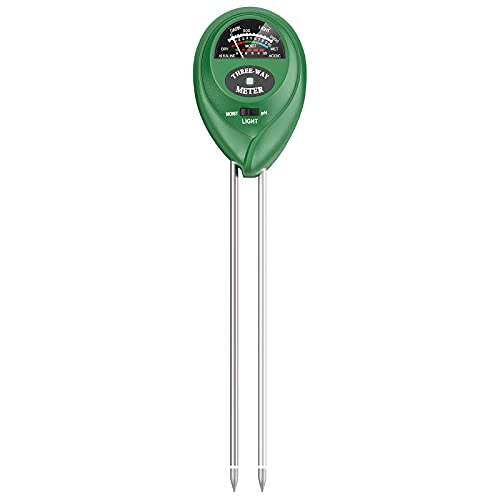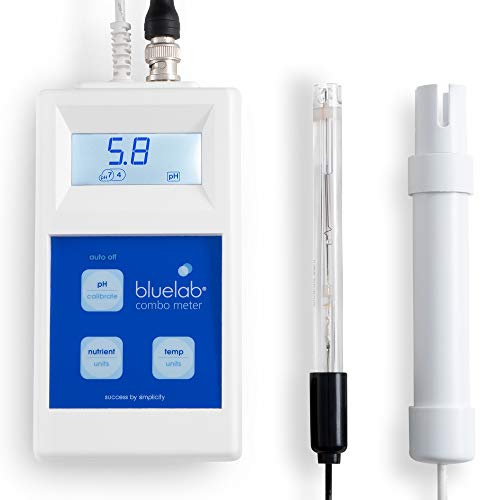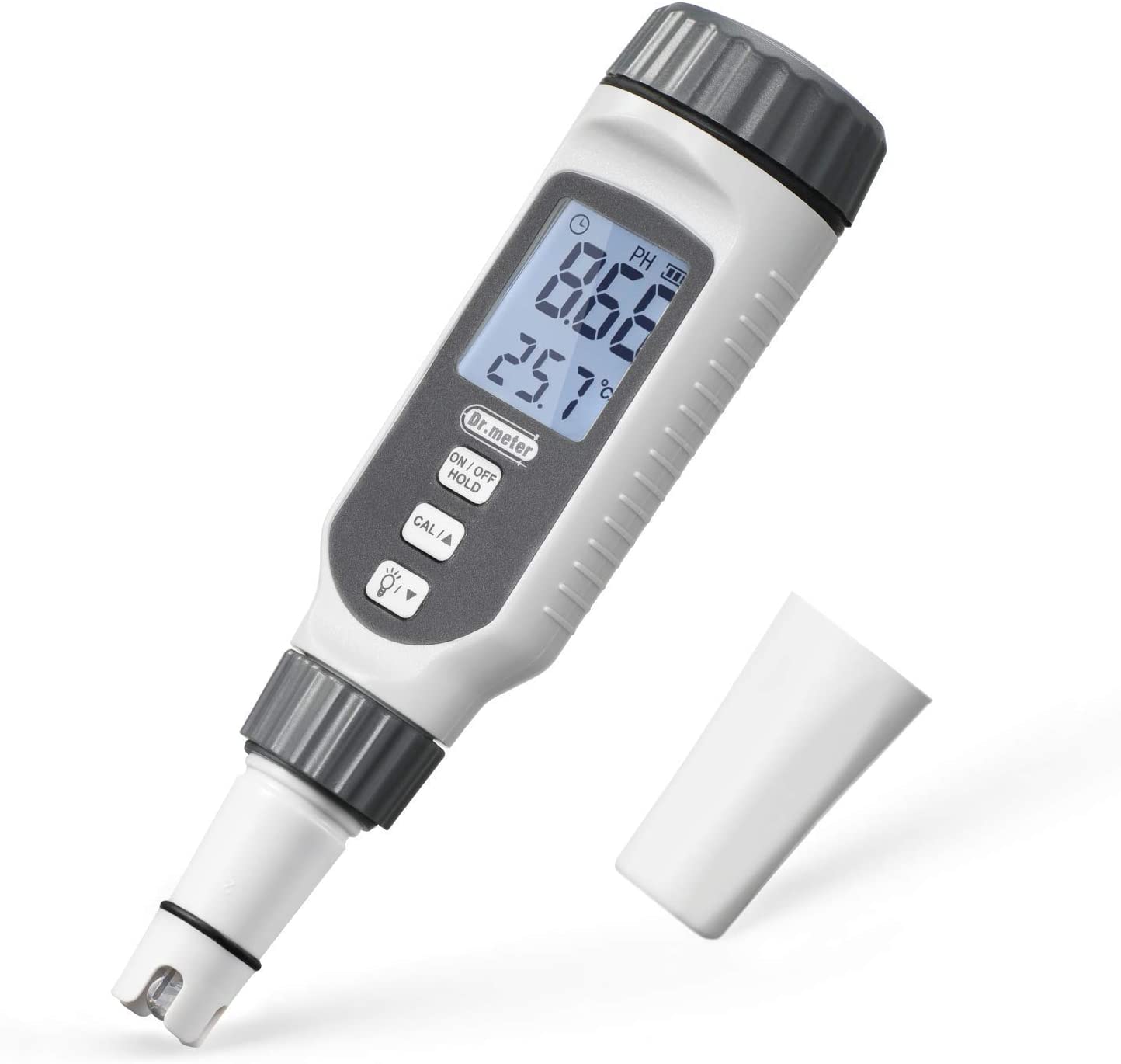As the legal cannabis industry continues to grow, it’s important for growers to have the tools to ensure they are producing high-quality products. One crucial aspect of cultivation is monitoring the pH levels of soil, water, and nutrient solutions. pH meters, pens, and test kits are essential tools for any cannabis grower looking to produce the healthiest and most potent plants.
Atree Soil pH Meter, 3-in-1 Soil Test Kits
The Atree Soil pH Meter is a 3-in-1 tester that;
- Measures the moisture content of the soil to let you know when to water
- Helps you determine whether the plant is getting enough light
- Helps you control pH level in soil, acidic or alkaline for your plants
The premium double-needle detection technology strongly enhances the speed and accuracy of detecting and analyzing soil moisture and pH acidity.
To use, simply insert the probes into the soil about 2-4 inches and you’ll get a reading. This meter easily and accurately reads moisture to promote healthy plants.
No battery is required, making this lightweight and portable meter great for indoor and outdoor use.
The Atree Soil pH Meter’s copper probe and aluminum probe provide scientific accuracy by sensing the changes of soil and transferring details to the conductor which displays the accurate values.
Pros
- Accurate and reliable
- Easy to use
- 3-in-1 soil test kit
- Lightweight and portable
- Scientifically accurate
Cons
- The pH display is small, but reflective of the price.
Digital PH Meter
The Digital pH Meter is an affordable and useful tool for anybody who needs a pH tester for household or hydroponic use.
This digital pH Meter is highly accurate for measuring a range of 0-14 pH with 0.1 pH resolution. Also, you’re able to measure and display pH results simultaneously with an LCD display for reliable and quick reading.
To use, simply remove the protective cap and immerse the pH meter electrode in the solution and turn to use the ON/OFF switch to measure. This is much easier than squinting to see the colors of a litmus strip.
The Digital PH Meter has an auto temperature compensation feature that adjusts to the water temperatures and quality to give instant pH readings. Additionally, you can calibrate this tester using buffing powder and the one-touch button.
Included in your purchase is a detailed manual that will show you how to get the best accurate and stable readings. You’ll also receive 3x pH buffer powders and 2x 1.5V LR44 button cells.
Pros
- Budget friendly
- Easy to calibrate
- Pocket size
- High quality
- Durable
- Easy to use
Cons
- We wish the design was a little taller to grab!
Bluelab METCOM Combo Meter
The Bluelab METCOM Combo Meter is an excellent portable tool that takes measurements of pH, conductivity, and temperature within a solution.
This is important because the correct pH, conductivity and temperature levels of nutrient solution are important for healthy and successful growth.
Are you experiencing issues with yellow leaves and slow growth? The Bluelab Combo Meter will soon tell you if the vital parameters are within the plant’s requirements.
The Bluelab Combo Meter has two probes, a Bluelab pH Probe and a Bluelab Conductivity/Temperature Probe.
To take a reading, simply place both probes both into the solution and your reading will be displayed on the screen.
The Bluelab Combo Meter doesn’t require a power supply to operate, therefore readings can be taken anywhere to manage your crop’s requirements.
This pH probe’s calibration instructions are supplied on the back of the meter.
After 30 days, the calibration indicators will disappear which is useful because it lets you know that calibration is due.
Pros
- Lightweight and portable
- Large display that’s easy to read
- Over range and under range indicators
- Low battery indicator
- Auto off function
- Simple push button calibration indicator
- 2x AAA batteries included
Cons
- Although we liked the meter, there’s a lot of dissatisfied reviewers considering the price point!
Dr.Meter pH Meter
The Dr.Meter Pocket Size pH Meter has a useful one-touch button that helps you to calibrate the digital pH tester. The three-point calibration method has simple calibration procedures that can automatically detect the calibration liquid to give you the pH reading in a flash!
The automatic temperature compensation function can identify possible inaccuracies that are caused by a change of liquid.
Measure pH value is simple with the Dr.Meter pH Meter. Remove the protective cap from the handheld pH meter and put the composite electrode into distilled water, and slowly stir for 5-10 seconds and spin-dry it once removed. Press the on/off button to turn on the unit and dip the electrode into the target solution once the whole electrode is submerged.
Lastly, stir the solution gently and wait for the value to stabilize, the LCD screen will display both the temperature and pH.
Pros
- Automatic calibration
- Convenient pH value reading
- High accuracy
- Budget friendly
- Automatic temperature compensation
Cons
- The instructions appear to be written by a non-english native speaker and can be hard to understand. This is not recommendable to beginners
SX610 Waterproof pH Pen Tester
The clever SX610 Waterproof pH Pen Tester will help you manage the success of your crops!
This pen has a pH and temperature reading of soils and hydroponics so that you know the correct nutrients are available to your plants and it measures your solutions too!
PH strongly influences the availability of nutrients and the presence of microorganisms and plants in the soil.
The SX610 Waterproof pH Pen Tester’s simple one-touch calibration fully automatic 1-pt calibration is ideal for regular solution samples ranging from 3-11 pH.
The handy features include easy to use buttons with selectable units, backlit LCD display, successful pH calibration indicator, hold and auto-off functions and low battery warning.
Included with your pen is an easy-to-follow start guide with instructions on how to get the most from your pen.
Pros
- Backlit LCD display
- Low battery warning
- Hold and auto off functions
- Fully waterproof
- Measures pH and temperature of solutions
Cons
- The bottles of solution are on the small side!
What is pH?
pH is the measure of the acidity or alkalinity of a solution on a scale of 0-14. Values between 0-6.9 are considered acidic, 7 is considered neutral, and 7.1-14 is considered alkaline. Cannabis plants require a pH range between 6.0-7.0 to absorb nutrients effectively.
Why is pH Important for Cannabis Cultivation?
Maintaining proper pH levels is crucial for cannabis plants because it affects the absorption of nutrients. If pH levels are too high or too low, some essential nutrients may become unavailable to the plant, leading to deficiencies, stunted growth, and reduced yields. Additionally, pH imbalances can cause nutrient lockout, where the plant cannot absorb nutrients even if they are present in the soil. This can lead to nutrient toxicity, where too many nutrients build up in the plant, causing damage.
pH Pens
pH pens are handheld devices that measure the pH levels of liquids quickly and accurately. They are small and easy to use, making them a popular tool for cannabis growers. pH pens use a sensor to measure the hydrogen-ion concentration of the solution and convert it into a pH value. Most pH pens have a range of 0-14, making them suitable for testing a wide range of solutions.
Pros of pH Pens
pH pens are a convenient way to measure the pH levels of solutions. They are portable and easy to use, allowing growers to test their plants quickly and accurately. Additionally, pH pens provide readings in real-time, allowing growers to make adjustments immediately if necessary.
Cons of pH Pens
One limitation of pH pens is that they require regular calibration to ensure accuracy. pH pens can also be sensitive to temperature, which can affect the readings. Lastly, pH pens are battery-powered, so growers need to ensure they have a backup battery on hand in case the device runs out of juice.
Test Kits
Test kits are a more traditional way of measuring pH levels. They typically come with test strips or drops that change color to indicate the pH level of a solution. Test kits are often less expensive than pH pens and can be used for multiple tests.
Pros of Test Kits
Test kits are an inexpensive and easy way of measuring pH levels. They are also convenient, as they can be used for multiple tests. Test kits are ideal for growers on a budget or those who don’t need to test pH levels frequently.
Cons of Test Kits
One limitation of test kits is that they are not as accurate as pH pens. Test kits can also be affected by factors such as lighting, which can affect the color interpretation. Additionally, test kits may take longer to provide results than pH pens.
Using pH Pens and Test Kits
To use pH pens and test kits, growers need to follow the manufacturer’s instructions carefully. Depending on the tool, growers will need to measure the pH level of water, soil, or nutrient solutions. After taking the reading, growers need to adjust it to the optimal range for cannabis plants. This can be done by adding chemicals to the solution to adjust the pH level or by using natural remedies such as compost. The optimal pH level for cannabis plants is between 6.0-7.0.
Our Pick
Recap
Ensuring that the pH levels of soil, water, and nutrient solutions are within the optimal range is one of the most critical aspects of cannabis cultivation. pH pens and test kits are convenient and accurate tools that can help growers monitor the pH levels of their plants. While pH pens are more expensive than test kits, they provide more accurate and real-time readings. Test kits are a less expensive alternative but may be less accurate and may take longer to provide results. Ultimately, choosing the right tool depends on the grower’s budget, the frequency of testing, and the level of accuracy required. By investing in pH pens or test kits, growers can produce healthier, more potent cannabis products and increase their yields.
Share the Love
If you found this post useful, please let others know about it by sharing it.





























